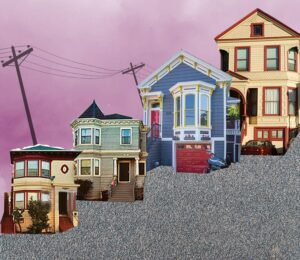Death is ever-present these days; now, one in three Americans personally knows someone who has died of COVID-19. Before the pandemic, we heard about incidences of mass deaths due to illness in the context of far corners of the globe, safely out of reach. We were insulated from death and could afford to ignore it, sweeping it into a corner of our uneasy minds. Now, death is close to home, and the time is right for dealing with the cultural discomfort it engenders.
There are multiple problems with the way we view death as a culture, and the pandemic poses an opportunity to evolve in how we think about death and practice death-related rituals. This unique moment is also an apt time to examine our history and try to understand how exactly we came to be this way.
One pressing concern about our death practices is the deleterious effect on the environment that they have.
“You might be surprised at how much environmental damage a person can do after they’re dead,” Erin Blakemore writes for the Smithsonian Magazine.
The prevalent use of embalming chemicals is of chief concern, as pumping these toxic and carcinogenic chemicals into the environment runs the risk of polluting groundwater and harming the living. While certain groups within the U.S. do not embalm, such as those from Orthodox Jewish communities, a disturbing majority of American burials do.
Many of us are relieved about the promise of a reversal in climate policy after watching with horror for four years as the Trump Administration systematically unraveled hard-won environmental protections and regulations. The administration of President Biden has made a commitment to taking ambitious measures to mitigate climate change. With our new commitment to sustainability as a nation, the time is right to consider the environmental impact of the dead and find new, greener solutions.
There are several ways to do this. Of the sustainable burial practices that have emerged in recent years, several stand out as particularly good alternatives to the status quo. One example is the burial pod developed by Capsula Mundi, which uses a corpse’s process of decay to feed a growing tree. This example presents the comforting and poetic idea of creating natural growth, a concept which could perhaps offset the shock of the transition from the casket-and-embalm procedure.
Composting bodies is a concept that has gained momentum recently.
“Within months, your loved one can become soil for your garden,” Molly Glick writes for the Sierra Club. Once placed in a special cylinder that periodically rotates, a corpse is combined with “a blend of fungi, protozoa, and bacteria to accelerate the breakdown of remains.”
The environmental concern brought up by death goes hand-in-hand with a more ideological and existential concern. We go to great lengths and do harm to the environment to embalm and beautify corpses, giving them luxurious boxes that are sealed and prevent degradation of the body. In this way, we deny death. We refuse death and fight it, but what better time is there than in the midst of COVID-19 to reassess our relationship with death? Perhaps this is an opportunity to deal with its environmental repercussions as well as challenge our deep-seated discomfort and rejection of the fact of death in our lives.
Perhaps a cross-cultural comparison would yield some insights. Many of the inhabitants of our neighbor, Mexico, have historically observed Dia de los Muertos (Day of the Dead), which involves a celebratory rather than funereal attitude and embraces acceptance of death as an undeniable part of the life cycle. Pre-COVID-19, I was fortunate enough to attend a Day of the Dead celebration hosted by the San Francisco Symphony. Marveling at the revelry, I was struck by the positive emotional effect of combining music with costume, color and a sense of joyful spirituality to tackle this taboo topic. Whereas Mexican culture welcomes “spirits” who reunite once a year with the living, our culture fears and abhors the idea of the dead.
The only time we seem to set aside to deal with death as a culture is mainly in jest, at Halloween. We trivialize death and have no meaningful or unifying cultural practice to deal with this most basic and profound of human events, a universal event that touches all lives.
It isn’t completely our fault that we’re so ill equipped to deal with death. We have inherited a discomfort with the topic. It might be worth noting that certain religious views surrounding death help to explain why we’re so steeped in denial. The “life after death” concept crosses cultural and religious boundaries. Like the Egyptian pharaohs, we endeavor to take our worldly possessions with us, including clothing and makeup-enhanced features, as we voyage into the proverbial afterlife in comfy, cushy coffins. This attempt to simulate life-like conditions reflects our pervasive discomfort with the idea of death.
The bottom line is, we have a moral imperative to deal more responsibly with death. It is long overdue and COVID-19 has highlighted this reality. By gaining some comfort with the fact of death and confronting our resistance to dealing with it, perhaps we can gain some confidence about being able to handle the entirety of the life cycle and have some measure of acceptance where before there was only denial.



